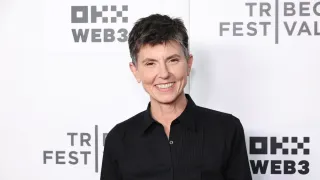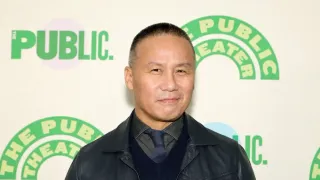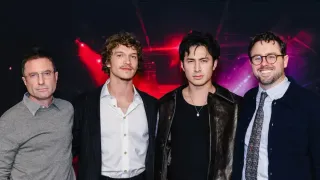February 27, 2024
In the ART's 'Becoming a Man,' Nonbinary Actor Stacey Raymond Asks the Hard Questions
Kilian Melloy READ TIME: 8 MIN.
EDGE: You play Polly, who's a memory of the main character, Carl, from an earlier time in his life. Can you say a bit about how you see that role?
Stacey Raymond: Polly is always informing Carl as he's changing and becoming who he is. Sometimes Carl's leaning into a little toxic masculinity a little too much, and Polly is coming in to say, "Remember when you were perceived as female, and you were being treated this way. Don't now become that guy." But at the same time, the embodiment of Polly is not the way Carl felt best about himself. It's sort of like, "How much of you do I want with me, and how much of you do I want to let go?"
EDGE: It's a fascinating internal dialogue, because not everyone has the experience of perceiving the world from these two different places and being perceived by the world in these two different ways.
Stacey Raymond: Exactly, and there's sort of an idea that you should be able to understand all perspectives because you've lived all perspectives. But even though Polly was being perceived as female, Polly never felt female. Polly always felt male. It's a very interesting role.
EDGE: When developing and researching that role, did you talk quite a lot with P. Carl, who adapted the play from his own memoir?
Stacey Raymond: P. Carl – who goes by Carl – co-directed with Diane Paulus. He was just so brave and so honest about, "This is how I was feeling, this is what was going on in this moment, and this is how things unfolded." He wanted Polly to be a constant presence with Carl throughout all these moments.
I read the memoir multiple times because I wanted to really soak it in. He wrote that memoir while he was going through a lot of these changes. It wasn't after the fact, so it was so rich with his inner life in those moments, which was very helpful in creating this character.
EDGE: What would you say is your personal connection to the material?
Stacey Raymond: Being nonbinary, I related to and understood what it feels like to be in situations where you're being perceived in a way that doesn't feel like it fits correctly. Just the fluidity of gender and the ability to put a character like that on stage is what really drew me, and my own personal relationship with my gender.
We've had talkbacks after every performance, and we've been hearing lots of people who've had no exposure to trans people [or] non-binary people, and this informed them so much.
EDGE: One of the things that jumped out at me was the point in the script where Carl says he's being besieged by his deadname when he's in his parents' house; he says it's "like being gunned down." When people misgender you, does it feel like that kind of experience to you?
Stacey Raymond: Yes, it can feel like somebody's putting something on you. They're putting their interpretation of you on you, so for me, for example, if I'm out to dinner with my wife and they say, "Hi ladies," there's like a feeling of, "Why do you just decide to label me 'lady?'" It just feels like wearing an itchy sweater. It doesn't feel right. So then, if you're taking this character who's going into his childhood home, and they're calling them the wrong name, it's sort of like you're being ambushed by these perceived perspectives rather than the truth of who you really are. It doesn't feel good at all, especially when it's people who supposedly love you not seeing you.
Gender is so much richer than we've ever been taught in the world. It's not two genders; there's so much more to it.
EDGE: When you're interacting with Petey Gibson, who plays Carl P. post-transition, what energy or vibe are the two of you exchanging?
Stacey Raymond: We always look at it like we're playing the same person, whether it's mirroring mannerisms or just going into conversations about the steps that led us to the moments that we're in. It's been great to not only have the real person in the room who wrote the play and experienced the story, but to then have another actor who's playing the future version of you. It's been very, very unique.
EDGE: You mentioned talkbacks. Can you say a bit more about what you're hearing from the audience?
Stacey Raymond: There have been a lot of trans people in the audience who will say, "Thank you for showing a character who isn't perfect." He's trying to find his way; he doesn't know how to be a man without leaning into some toxic masculinity. A lot of people are saying, "I was a little embarrassed about this aspect of him because I'm seeing myself in that, and I know I'm going through that and I haven't had the right role models, and I want to be accepted but I don't know what that means." There's been a lot of recognition. Like, "It's been nice to see myself up there [on stage]."
There's always this weight with the story. You want it to put the right messages out there.
EDGE: It's such an extraordinary script, and from what I hear from people who've seen it, they just love it.
Stacey Raymond: We've had audience members be like, "I need to come back. I need to see this again, and I'm gonna bring my friends, and I'm gonna bring my friends' kids." It's really resonating with people. We've had standing ovations and just loving crowds. Yeah. Fantastic.
"Becoming a Man" continues at the American Repertory Theater, 64 Brattle Street, Cambridge, MA. For more information, vist the American Repertory Theater's website.






